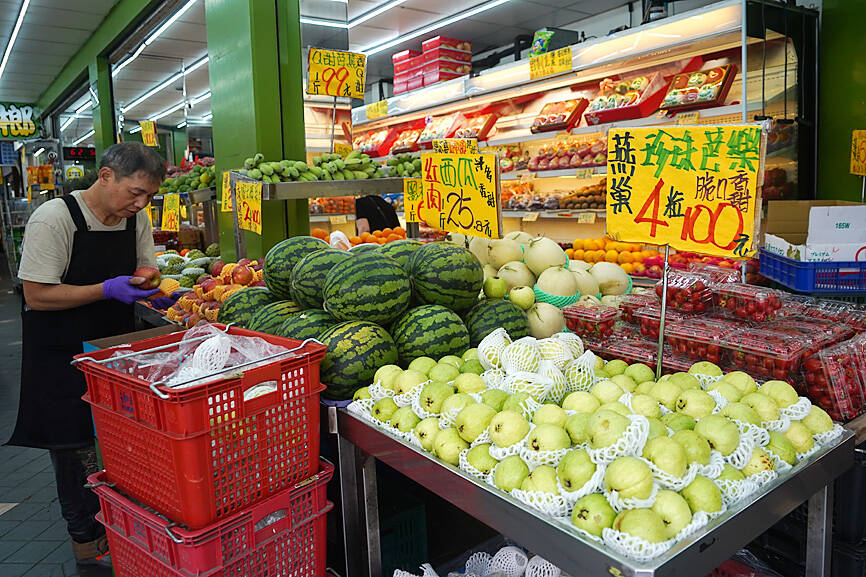The consumer price index (CPI) last month grew 2.29 percent from a year earlier, above the central bank’s 2 percent threshold and accelerating from the 1.58 percent increase the previous month, the Directorate-General of Budget, Accounting and Statistics (DGBAS) reported yesterday.
On a monthly basis, the CPI rose 0.04 percentage points, which the DGBAS attributed to price increases in eggs and fruits, despite price declines in vegetables, clothes and gasoline products.
“The annual increase of 2.29 percent in CPI last month came as fruit prices remained high due to the low post-typhoon recovery in harvests,” DGBAS official Tsao Chih-hung (曹志弘) told a news conference in Taipei.

Photo: CNA
Banana prices rose 107.32 percent and tomato prices increased 49.82 percent from a year earlier, the agency’s data showed.
Fruit price growth last month hit a more than eight-year high, and the increase in fruit and vegetable prices together contributed about 0.74 percentage points to the CPI growth last month, Tsao said.
Meanwhile, the cost of dining out rose by more than 3 percent for the fifth consecutive month last month.
Overall, the food price spike contributed 1.32 percentage points to the overall CPI growth in the month, he said.
The core CPI, which excludes vegetables, fruit and energy, grew 1.63 percent from a year earlier last month, below the 2 percent mark, Tsao said, adding that it indicated local consumer prices remained stable.
In the first three months of this year, the CPI increased 2.18 percent compared with the same quarter last year, the DGBAS said.
Asked whether the “reciprocal” tariffs of up to 32 percent on Taiwanese goods announced by US President Donald Trump, and which are to take effect today, would push up production costs and add inflationary pressure in Taiwan, Tsao said the public should not worry.
The US tariffs could also hurt demand, sending raw material prices lower, which is expected to cap price growth, he said.
“As the tariffs might negatively affect global and US economic activity, and weaken global demand and raw material prices, Taiwan faces no significant risk of rising inflation in the short term,” he said.
The CPI is unlikely to skyrocket this year due to the tariff effect, Tsao said.
Even if price hikes happen, the government would introduce measures to mitigate the impact, he added.
Meanwhile, the producer price index (PPI) rose 3.53 percent from a year earlier last month, largely due to an increase in prices of agricultural products, computers and optoelectronics as well as an increase in electricity rates, the DGBAS said.
In the first three months, the PPI rose 3.69 percent from a year earlier, the agency said.
Additional reporting by CNA

Intel Corp chief executive officer Lip-Bu Tan (陳立武) is expected to meet with Taiwanese suppliers next month in conjunction with the opening of the Computex Taipei trade show, supply chain sources said on Monday. The visit, the first for Tan to Taiwan since assuming his new post last month, would be aimed at enhancing Intel’s ties with suppliers in Taiwan as he attempts to help turn around the struggling US chipmaker, the sources said. Tan is to hold a banquet to celebrate Intel’s 40-year presence in Taiwan before Computex opens on May 20 and invite dozens of Taiwanese suppliers to exchange views

Application-specific integrated circuit designer Faraday Technology Corp (智原) yesterday said that although revenue this quarter would decline 30 percent from last quarter, it retained its full-year forecast of revenue growth of 100 percent. The company attributed the quarterly drop to a slowdown in customers’ production of chips using Faraday’s advanced packaging technology. The company is still confident about its revenue growth this year, given its strong “design-win” — or the projects it won to help customers design their chips, Faraday president Steve Wang (王國雍) told an online earnings conference. “The design-win this year is better than we expected. We believe we will win

Chizuko Kimura has become the first female sushi chef in the world to win a Michelin star, fulfilling a promise she made to her dying husband to continue his legacy. The 54-year-old Japanese chef regained the Michelin star her late husband, Shunei Kimura, won three years ago for their Sushi Shunei restaurant in Paris. For Shunei Kimura, the star was a dream come true. However, the joy was short-lived. He died from cancer just three months later in June 2022. He was 65. The following year, the restaurant in the heart of Montmartre lost its star rating. Chizuko Kimura insisted that the new star is still down

While China’s leaders use their economic and political might to fight US President Donald Trump’s trade war “to the end,” its army of social media soldiers are embarking on a more humorous campaign online. Trump’s tariff blitz has seen Washington and Beijing impose eye-watering duties on imports from the other, fanning a standoff between the economic superpowers that has sparked global recession fears and sent markets into a tailspin. Trump says his policy is a response to years of being “ripped off” by other countries and aims to bring manufacturing to the US, forcing companies to employ US workers. However, China’s online warriors